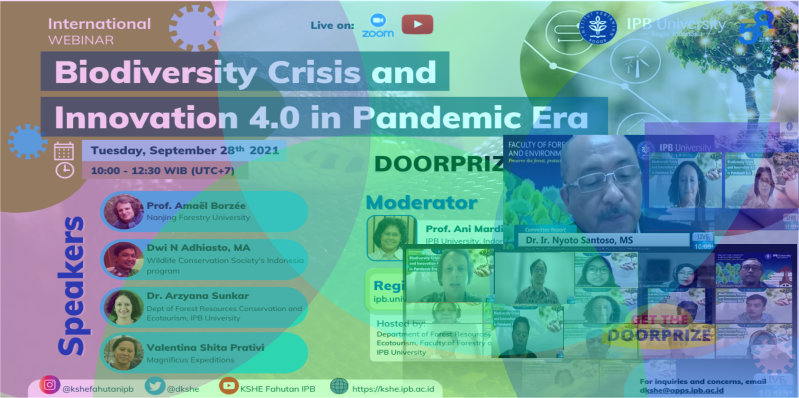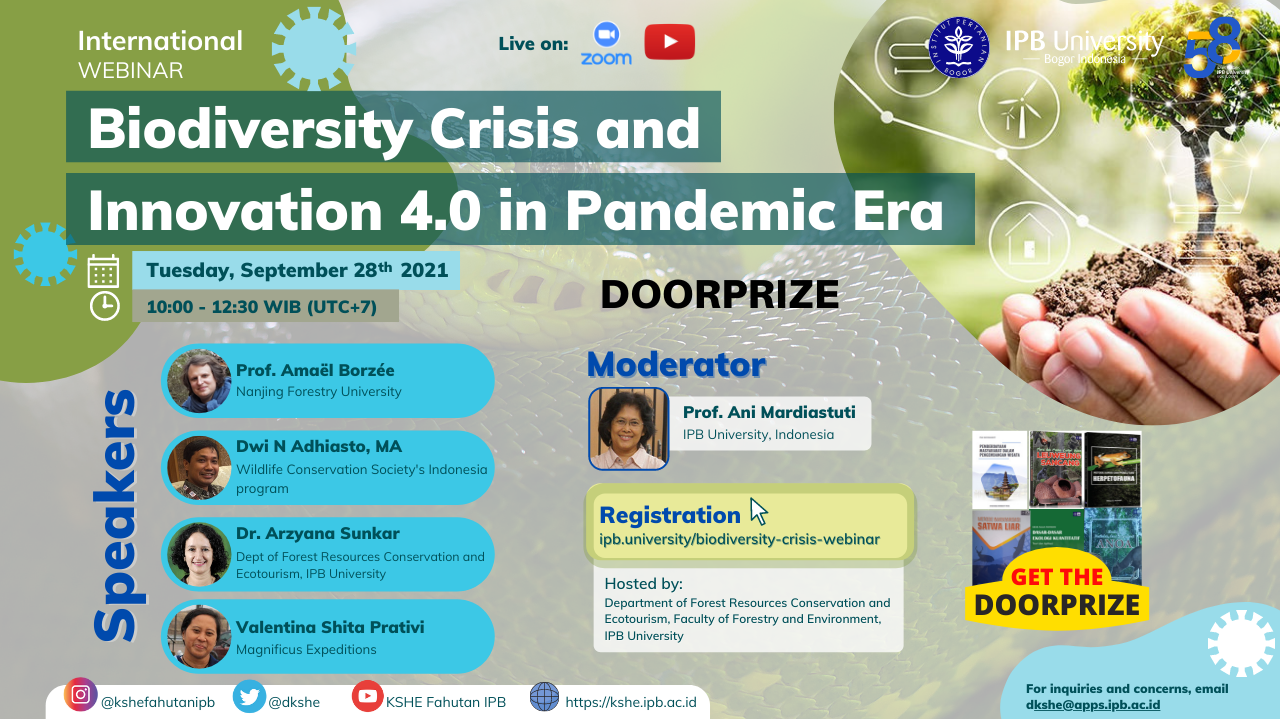Pandemi COVID-19 telah menyebabkan tantangan pada berbagai aspek kehidupan, tidak hanya menyangkut aspek sosial, politik, dan ekonomi, namun juga lingkungan dan keanekaragaman hayati dunia. Dalam dua tahun terakhir setelah kasus pertama COVID-19, pengembangan dan upaya konservasi keanekaragaman hayati telah mengalami perlambatan. Oleh karena itu, untuk mengatasi permasalahan tersebut, diperlukan strategi dengan mengintegrasikan inovasi 4.0 dalam pengelolaan keanekaragaman hayati di era pandemi untuk kesejahteraan manusia dan mahluk hidup lainnya. Hal ini diungkapkan pada gelaran Seminar Internasional dengan tema Biodiversity Crisis and Innovation 4.0 in Pandemic Era, yang telah dilangsungkan pada 28 September 2021lau. (28/9) oleh Departemen Konservasi Sumber Daya Hutan dan Ekowisata, Fakultas Kehutanan dan Lingkungan (Fahutan) IPB University.
Seminar ini menghadirkan pakar yang kompeten di bidang konservasi sumberdaya hutan dan lingkungan hidup dari China dan Indonesia. Mereka adalah Prof Amael Borzee dari Nanjing Forestry University (China), Dwi N Adhiasto, MA dari Program Masyarakat Konservasi Satwa Liar (Indonesia), Dr Arzyana Sunkar dari Departemen Konservasi Sumber Daya Hutan dan Ekowisata, Fahutan IPB University dan Valentina Shita Prativi dari Ekspedisi Magnificus (Indonesia).
Dalam sambutannya, Ketua Departemen Konservasi Sumber Daya Hutan dan Ekowisata, Dr Nyoto Santoso menyampaikan apresiasinya terhadap terselenggaranya acara ini. Menurutnya, tema acara ini relevan dengan apa yang telah dilakukan IPB University, yaitu sebagai bentuk komunikasi dan upaya sosialisasi kepada masyarakat luas tentang krisis keanekaragaman hayati saat ini serta mengetahui bagaimana inovasi 4.0 digunakan untuk mengatasi krisis di masa pandemi,”. Harapannya pertemuan awal ini akan membuka ruang komunikasi bagi banyak pihak, terutama yang aktif dalam menjaga keanekaragaman hayati di berbagai belahan dunia.
Dekan Fahutan IPB University, Dr Naresworo Nugroho dalam kesempatannya menyampaikan bahwa hanya sedikit laporan ilmiah yang menunjukkan dampak pandemi pada masalah konservasi. Bandingkan dengan informasi tentang konsekuensi sosial, ekonomi, politik dan terkait kesehatan. Beliau menambahkan bahwa berdasarkan riset yang dilakukan Brown 2020, Bancroft 2020, Ma’ia’I 2020, telah terjadi peningkatan perusakan hutan hujan Amazon hingga 55 persen. Hal ini terjadi dalam empat bulan pertama tahun 2020. Terumbu karang yang berusia berabad-abad di Karibia rusak permanen sebagai akibat dari kurangnya pengobatan terhadap penyakit jamur dan spesies invasif.
“Dari riset tersebut, dunia menghadapi peristiwa kepunahan massal keenam. Ada satu juta spesies tumbuhan dan hewan yang sekarang terancam punah karena perubahan penggunaan lahan dan laut, eksploitasi berlebihan, perubahan iklim, polusi, dan spesies asing invasif,”. Menurutnya, keanekaragaman hayati juga menopang kesehatan, kesejahteraan dan kemakmuran manusia saat ini dan di masa depan. “Oleh karena itu, dengan diadakannya webinar ini diharapkan dapat lebih memperluas pemahaman dan kesadaran kita tentang keanekaragaman hayati, dengan inovasi 4.0 yang aplikatif dan inisiatif teknologi menjadi salah satu aspek yang berkembang sangat cepat untuk dapat beradaptasi dengan kondisi yang berubah, serta mengintegrasikan inovasi 4.0 dengan pengelolaan dan penanggulangan masalah yang terjadi pada keanekaragaman hayati kita,ujarnya.
Kutipan : IPB Today – https://ipb.ac.id/news/index/2021/09/fakultas-kehutanan-dan-lingkungan-ipb-university-gelar-seminar-internasional-bahas-krisis-biodiversitas-di-era-pandemi/94c2a6a9e5e458f8ab5e9f8f0d8167b6


